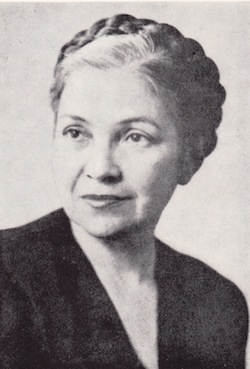Candles of Song: Yiddish Poems about Mothers by Rashel Veprinski

Photo of Rashel Veprinski. From Tsum eyntsikn shtern (To the Lone Star), Tel-Aviv, 1971.
A New Kind of Kadish
On January 25, 2012 (Shevat 1) my dear, sweet, gentle mother passed away. Although it is customary in the Jewish tradition to say kadish for 11 months after the death of a parent and although I do belong to a conservative synagogue it somehow did not feel natural for me, an agnostic, to say kadish for my mother, a Canadian born Yiddish speaker, also an agnostic brought up in the tradition of secular Yidishkeyt. However, I am doing it (not totally regularly) and while I do find the act somewhat meaningful it does not essentially express who I am as a Jew and who she was.
I decided, therefore, to create a blog of Yiddish poems about mothers in her memory. Each week I shall post one Yiddish poem, both in Yiddish and in transliteration, with an accompanying English translation. Some of the translations will be my own, others will be by other people. Sources will always be noted. Each poem will be preceded, wherever possible, by a brief biography and photo of the poet, as well as a recording of the poem in Yiddish.
I have chosen to call this blog “Candle of Song” after a line in a poem by Rashel Veprinski (Piously as my mother the waxen wicks,/I light my candle of song). To me it is a beautiful metaphor of how the pious act of lighting Sabbath candles got transformed for the poet into the, for her, equally spiritual act of writing Yiddish poetry. The title is for me also evocative of yortsayt-likht (memorial candles) although it was not the poet’s intention. With this in mind, I have chosen to make Veprinski’s poem “Frum” (Piously) my first offering.
Rashel Veprinski (1896-1981) was born in the town of Ivankov, not far from Kiev, in Ukraine. She came to New York in 1907, and at thirteen she went to work in a shop. At fifteen, she began writing poetry, and was first published in 1918 in the journal Di naye velt (The New World). She wrote several books of poetry, among them Ruf fun foygl (The Call of the bird), 1926, Di Palitre (The palette), 1964, Tsum eyntsikn shtern (To the single star), 1971 as well as an autobiographical novel, short stories, and articles and was published regularly in Yiddish periodicals. From the 1920s until his death in 1953, she lived with the famous Yiddish writer Mani Leyb. (Those wishing to read the biographies in Yiddish can do so at my blog.)
Here, Frum, by Rashel Veprinski, read by Sheva Zucker:



